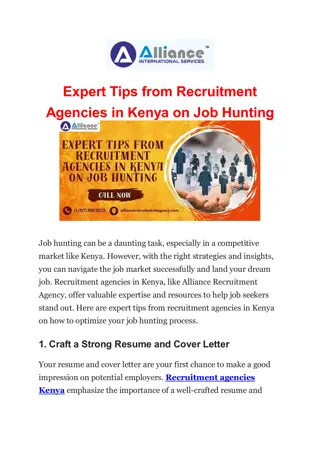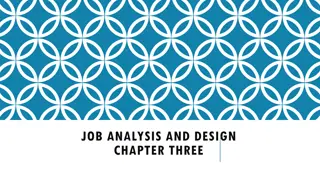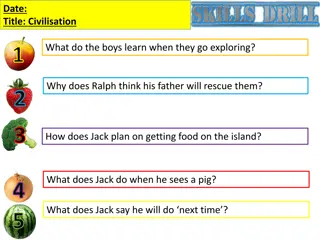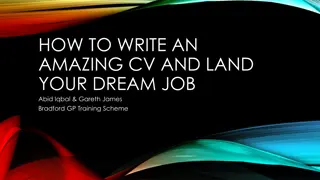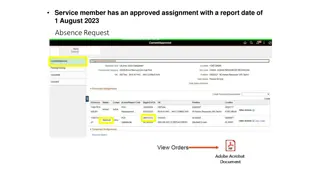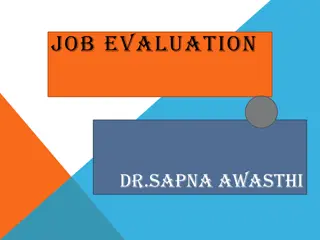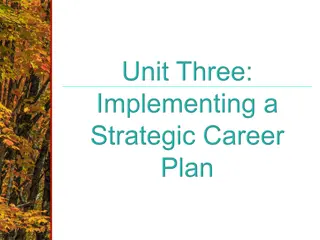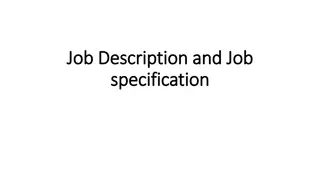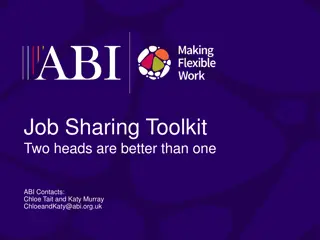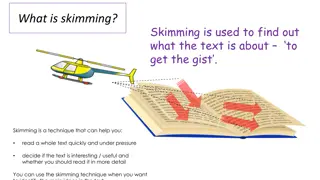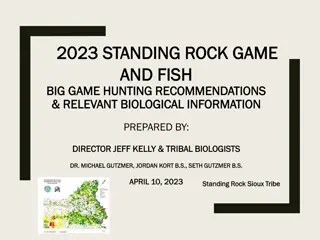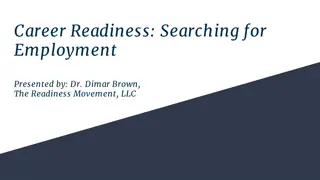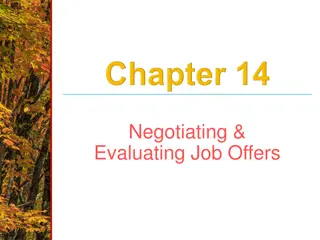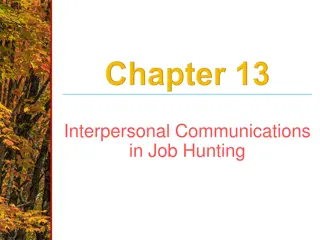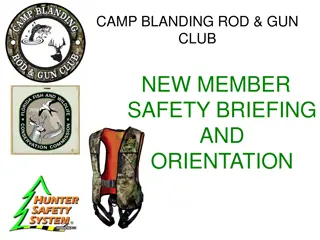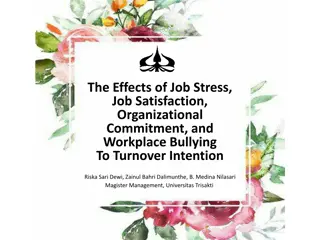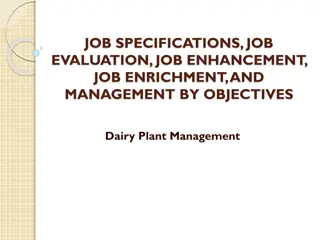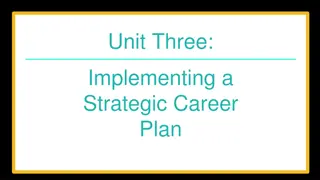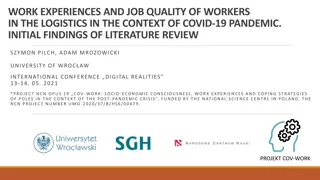Mastering Job Hunting Strategies
In this comprehensive guide, you'll discover valuable insights on the hiring process, job market trends, and effective job search tactics. Explore how to enhance library support for job seekers and gain a competitive edge in your career aspirations. Unveil survey findings on application trends and interview experiences, along with captivating stories of resilience and survival. Uncover the hidden truths behind library job ads and learn what it truly takes to succeed in the workforce.
Download Presentation

Please find below an Image/Link to download the presentation.
The content on the website is provided AS IS for your information and personal use only. It may not be sold, licensed, or shared on other websites without obtaining consent from the author.If you encounter any issues during the download, it is possible that the publisher has removed the file from their server.
You are allowed to download the files provided on this website for personal or commercial use, subject to the condition that they are used lawfully. All files are the property of their respective owners.
The content on the website is provided AS IS for your information and personal use only. It may not be sold, licensed, or shared on other websites without obtaining consent from the author.
E N D
Presentation Transcript
Job Hunting Like a Boss Dave Hodgins & Miranda Doran-Myers Library Research Service https://www.lrs.org/jobhunting
Objectives You gain a better understanding of how employers view the hiring process. You talk with colleagues about ideas for how your library can better support patrons who are job hunting. You are better prepared to compete for your dream job!
LRS conducted a survey of job seekers. Respondents were more likely to have applied for how many positions? Less than 10 10 to 20 More than 20+
60 Second Survey Those looking for a library job were more likely to say they had applied to more than 20 positions - some had applied to up to 100! Those who are employed were more likely to say that they applied to 1-5 jobs before getting a position. However, a significant portion also said they applied for more than 20. Most people who are employed in a library position interviewed one time before getting their job, while hardly anyone who is seeking a library position has had the chance to interview.
Shackleton & The Endurance 28 crew members Several months stranded on ice and remote, uninhabited islands Two lifeboat journeys over hundreds of miles of open seas
Every. Single. Person. Survived.
MEN WANTED Men wanted for hazardous journey. Low wages, bitter cold, complete darkness. Safe return doubtful. Honour and recognition in event of success. long hours of
Library job ads are generally... terrible
Library Job Ads... Tell you what you need in order to be hired. DO NOT not tell you what you need in order to succeed. DO NOT convey meaningful info about the culture of the organization.
Sailor Tech Wanted Must be able to push a cart weighing 50 pounds. Occasionally bend, stoop, kneel, crouch, crawl, climb, or balance. Must have rope typing skills.
Research Makes - or BREAKS - Your Chances
Its not You, Its Me Bosses look for good fit, because excellent bosses know that skills can be taught but personality cannot. The least compelling thing you can demonstrate to an employer is that you meet the requirements of the job. The most compelling thing you can demonstrate is that you understand the the role of the position and how it fits within the organization.
Know the Position Research conferences and workshops relevant to the position. Find presentations, handouts, publications, and other materials by professionals in similar positions. Research job ads for the same/similar positions. Look for keywords and concepts that you should research further. You are building a vocabulary that will create dialog that goes beyond you simply parroting the job ad.
Know the Organization Find the organization s blogs, social media, newsletters, and, if you are really hardcore, their meeting minutes. Find presentations and publications by potential managers and colleagues. Be prepared to answer questions like... How many employees are there? How does the position s unit fit within the organization s hierarchy? What are the mission and vision of the organization? What major projects are in the works?
Casually mention a project, area of interest, or idea that you found in one of the aforementioned sources and you are guaranteed to set yourself apart from 99% of the other candidates.
A Job Interview is Not a Pop Quiz Anticipate insightful questions. Bosses ARE NOT looking for off-the-cuff responses. Bosses ARE looking for good conversation, and that only happens when you are well-prepared.
Anticipate Smart Questions Create a list of 20 questions that, based on your research so far, you anticipate being asked. Show, don t tell. Draw from your experiences and come up with real-world examples of how you make a difference. If you are new to the profession, tell me how you would do something. Hand write your responses until you can repeat them from memory.
What is the most difficult interview question? Where do you see yourself in 5 years? What is your management style? Give an example of a time when you had to work in a team. Other (shout it out)
The hardest question to answer is, How does this position fit with your short- and long-term career goals? Your response should demonstrate that you and the organization will benefit from your continued professional growth.
The easiest question to answer - and one that 99% of candidates screw up - is, What is one of your weaknesses Your response should NOT including anything personal, significant, and/or potentially devastating, but should instead focus on some trivial part of the job description. I see your library uses Library of Congress. I only have experience with Dewey, so
Tell Your Story Your questions are not really questions, but are opportunities for further conversation. Since your question time is always at the end of the interview, use the additional conversation time to emphasize what you can do for the organization, and to discuss skills and/or experiences that were not addressed by the questions they asked you. Give the organization opportunities to showcase their success. I noticed on your website that you are currently doing X and Y; how are those projects coming along?
Boring candidates ask boring questions which make for boring conversations.
Your Questions Must Demonstrate... You are excited about the position. What are 1 or 2 projects that will want me to tackle in my first 6 months? You have a good understanding of the position. I see the position requires web development skills. Tell me about your use of open-source frameworks or other types of content management systems? You understand that work is about people and relationships. How do you all, as a team or organization, celebrate your successes?
Your Application Materials (in General)
Outsource Your Proofreading You usually have grammar, spelling, and situational awareness issues in your documents. If you are doing it right, you spend so much time staring at your own work that your perception and reality...diverge. Identify two reliable proofreaders: one in the profession and one out. You will find that they focus on different, but important, aspects of your work.
Please Stop Designing Your Documents Are you applying for a graphic design job? YES NO Feel free to be creative with typography, color, etc. Don t even think about designing
The One and Only Rule for Application Design Be consistent. Body text is 12 pt Arial Headings are 24 and 36 pt (no more than 2) 1 margins Black and white
Always submit your application materials in PDF format. When I open your .doc[x] files, there is no guarantee that I will experience the formatting and layout that you intend. (P.s. you also sometimes have metadata, tracked changes, and comments that, while often humorous, are not relevant.
I am not interested in... Your social media, personal blogs, hobbies, college clubs, reading preferences. You almost never submit (but I would love to see)... Portfolios, publications, and other relevant professional works.
Your Resume Choose a consistent format (Googling is perfectly acceptable here). Relevance is more important than length. Focus on your WHAT. Keep it up-to-date. https://www.lrs.org/documents/job-hunting/sample_resume.pdf
Your References Assume nothing. Interview your references. When choosing a reference, go for substance over title. A Director of who cannot speak directly to the quality of your work is less effective than a colleague with whom you have worked closely. You should provide every reference with a copy of the job description, and the cover letter and resume you will submit.
Give your references talking points. It is not cheating to help your references help you. Period. End of sentence.
It is (painfully) obvious to us when you have simply Googled cover letter example.
Cover Letters are Hard To whom it may concern, Please accept this letter in application for the position of Librarian at Pebble Brook Library, as advertised on LibraryJobline.org. I believe you will find that I am well qualified for the position. You will also find attached my resume and a list of 5 references. I have 10 years of experience working in public libraries. My current and previous duties include working at the reference desk for 20 hours per week, processing interlibrary loan (ILL) materials, and supervising 5-10 student shelvers.
Your cover letter is not an annotated version of your resume. It is the start of a conversation.
An excellent cover letter is almost always one-time-use only.
Elements of an Excellent Cover Letter Open with enthusiasm I am excited to apply for the position of Research Assistant currently open at the Colorado State Library Share vision/beliefs I believe that harnessing data and making it accessible is essential for helping libraries to demonstrate impact in their communities, and my communication skills and sharp attention to detail would make me an asset in furthering this cause.
Elements of an Excellent Cover Letter Reflect on your success/experience Through this combination of theoretical and practical training, I have learned the importance of data and emerging technologies for helping libraries to both engage with their communities and understand how to better serve those communities as they evolve.
Elements of an Excellent Cover Letter Show ambition I was drawn to a career in libraries because I know it is a rapidly changing profession and want to be a part of redefining the role of libraries in all the kinds of communities that they serve. I also would like to strengthen my leadership abilities by working with library stakeholders in a variety of forums to become an effective voice for how libraries can use data to demonstrate their impact on and importance to 21st century communities.
Elements of an Excellent Cover Letter WHY, not WHAT What I offer is a strong foundation of theory and practice in research and data analysis, coupled with a vision of how advocating data-driven evaluation initiatives can enrich conversations about the role of libraries today. https://www.lrs.org/documents/job-hunting/outstanding_cover_letter.pdf
WHY do you do what you do? Everyone has a WHY. Your WHY is the purpose, cause or belief that inspires you.
WHAT WHY Provided reference service for genealogy vs. Connected my patrons to their past Worked at the welcome/circulation desk vs. Created a welcoming environment for my community Maintained the library website vs. Provided access to the library for those who can t make it to the physical premises In charge of toddler storytime vs. Passionate advocate for the importance of early childhood literacy




